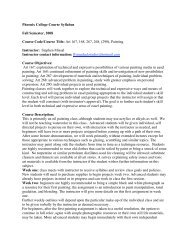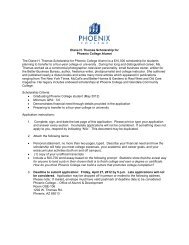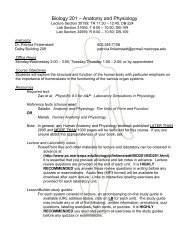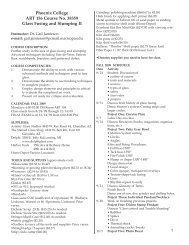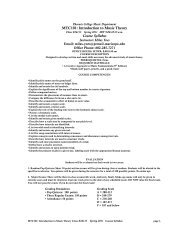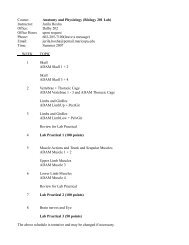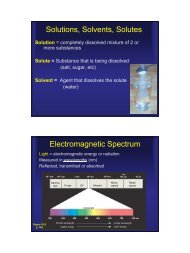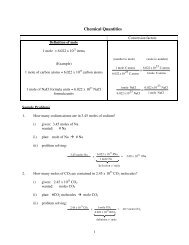Phoenix College Programs - Multiple Choices - Maricopa ...
Phoenix College Programs - Multiple Choices - Maricopa ...
Phoenix College Programs - Multiple Choices - Maricopa ...
You also want an ePaper? Increase the reach of your titles
YUMPU automatically turns print PDFs into web optimized ePapers that Google loves.
Health Care<br />
174 • <strong>Phoenix</strong> <strong>College</strong> 2005-2006 Catalog<br />
Department Chairperson: Dr. K. Lewis<br />
Basic Emergency Medical Technology<br />
Certificate of Completion — CCL 5268<br />
8 Credits<br />
This program includes techniques of emergency care,<br />
stabilization, and immobilization of victims of illness and injury.<br />
Recognition and documentation of signs and symptoms of<br />
illness and injury, intervention, and evaluation of the<br />
intervention, techniques for assessment, administration of<br />
oxygen, use of specific immobilization devices, and preparation<br />
for transportation are other areas of the program.<br />
Program Note: Students must earn a grade of “C” or better in<br />
all courses required within the program.<br />
Program Prerequisites: 0.5-3 Credits<br />
CRE101 Critical and Evaluative Reading I+ (3) OR<br />
CRE111 Critical Reading for Business & Industry+ (3) OR<br />
Equivalent by assessment 3<br />
EMT/HLR101 Cardiopulmonary Resuscitation/Basic<br />
Cardiac Life Support (0.5) OR<br />
Current American Red Cross or American<br />
Heart Association Basic Life Support<br />
Health Care Provider validation 0.5<br />
Required Courses: 8 Credits<br />
EMT/FSC104 Basic Emergency Medical Technology + 8<br />
Please Note: The Basic Emergency Medical Technology<br />
certificate requires a G.P.A. of 2.5.<br />
Department Chairperson: Dr. K. Lewis<br />
Emergency Communications & Deployment<br />
Certificate of Completion — CCL 5775<br />
2 Credits<br />
Tactical methods of communication, interview, interrogation,<br />
assessment, and deployment. Communication devices include<br />
radio, telephone, computer-aided dispatch; mobile digital<br />
transmitter. Highlights of human anatomy, physiology disease<br />
profiles, and approach to interventions in life-threatening<br />
situations. Persuasive delivery of pre-arrival instructions, most<br />
dispatch communications, basic life support techniques for all<br />
age groups. Communication with law enforcement on all levels<br />
within the community and the state. Contribution to research,<br />
quality assurance, and prevention. Education and training to<br />
help student function as an emergency dispatch professional.<br />
Program Notes: Students must earn a grade of “C” or better in<br />
all courses required within the program.<br />
Program Prerequisites: None.<br />
Required Courses: 2 Credits<br />
EMT/HLR101 CPR: Basic Cardiac Life Support 0.5<br />
EMT/FSC116 Emergency Medical Communications<br />
(EMD)+ 1.5<br />
Department Chairperson: Dr. K. Lewis<br />
Intermediate Emergency Medical Technology<br />
Certificate of Completion — CCL 5271<br />
25 Credits<br />
The Certificate of Completion in Intermediate Emergency<br />
Medical Technology is designed to provide advanced<br />
techniques of emergency care, stabilization, and immobilization<br />
of victims of illness and injury. The techniques of emergency<br />
care include but are not limited to assessment, detailed physical<br />
examination, recognition and documentation of signs and<br />
symptoms of illness and injury, critical thinking and diagnosis<br />
intervention, and the evaluation of the interventions. The<br />
techniques of assessment include but are not limited to<br />
electrocardiographic rhythm identification, administration of<br />
oxygen, defibrillation, synchronized cardioversion,<br />
transcutaneous pacing, and advanced airway techniques. The<br />
techniques for immobilization of the victim include but are not<br />
limited to use of specific immobilization devices, peripheral<br />
intraosseous and central intravenous techniques, and<br />
preparation and care during transportation.<br />
Program Notes: Students must earn a grade of “C” or better in<br />
all courses required within the program.<br />
Admission Criteria: Prior to being considered for and accepted<br />
into the program, students must complete specified exams and<br />
an oral interview with the EMT/FSC department. Additionally,<br />
students must have a recommendation from a referring agency.<br />
Finally, students should seek department advisement on<br />
completing program prerequisites prior to acceptance into the<br />
program.<br />
Program Prerequisites: 21 Credits<br />
BIO160<br />
Introduction to Human Anatomy &<br />
Physiology + 4<br />
EMT/FSC104 Basic Emergency Medical Technology + 8<br />
EMT235 Emergency Cardiac Care + 3<br />
ENG101 First-Year Composition + (3) OR<br />
ENG107 First-Year Composition for ESL + (3) 3<br />
MAT102 Mathematical Concepts/Applications + (3) OR<br />
Note: Equivalent OR Satisfactory score on<br />
District placement exam. 3<br />
Required Courses: 25 Credits<br />
EMT208 Intermediate Emergency Medical<br />
Technology + 16<br />
EMT208AA Intermediate Emergency Medical<br />
Technology Practicum + 2<br />
EMT236 Pharmacology in an Emergency Setting + 3<br />
EMT/FSC238 Vehicular Extrication and Patient<br />
Stabilization + 2<br />
EMT245 Trauma Management I + 2<br />
Please Note: The Intermediate Emergency Medical<br />
Technology certificate requires a G.P.A. of 2.5.<br />
For additional information on PC program competencies, visit:<br />
http://www.dist.maricopa.edu/<br />
academic/curric/progpc.php<br />
For additional information on MCCCD course competencies, visit:<br />
http://www.dist.maricopa.edu/<br />
academic/curric/cs.php



